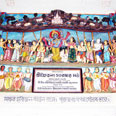Tag: Raghunath Das Goswami
-
Śrīla Bhakti Sundar Govinda Dev-Goswāmī Mahārāj discusses the proper approach to divinity, and the genuine humility of the true Vaiṣṇavas.
-
Srila Bhakti Nirmal Acharya Maharaj and devotees from Sri Chaitanya Saraswat Math held a preaching programme in Panihati on the anniversary of Srila Raghunath Das Goswami’s Danda Mahotsav.




